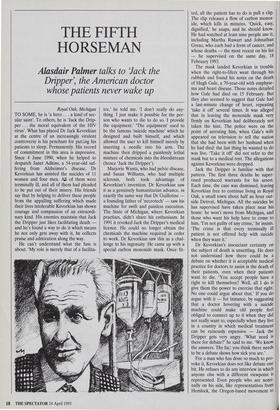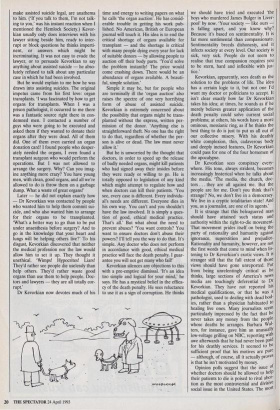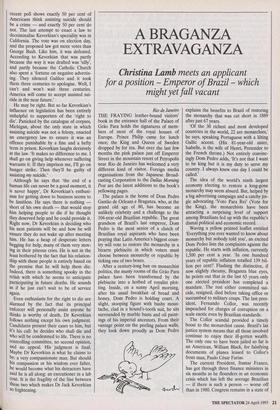THE FIFTH HORSEMAN
Alasdair Palmer talks to 'Jack the
Dripper', the American doctor whose patients never wake up
Royal Oak, Michigan TO SOME, he is 'a hero . . a kind of sec- ular saint'. To others, he is 'Jack the Drip- per . . . the moral equivalent of the HIV virus'. What has placed Dr Jack Kevorkian at the centre of an increasingly virulent controversy is his penchant for putting his patients to sleep. Permanently. His record of commitment in this area is impressive. Since 4 June 1990, when he helped to despatch Janet Adkins, a 54-year-old suf- fering from Alzheimer's disease, Dr Kevorkian has assisted the suicides of 11 women and four men. All of them were terminally ill, and all of them had pleaded to be put out of their misery. His friends say that by helping to deliver these people from the appalling suffering which made their lives intolerable Kevorkian has shown courage and compassion of an extraordi- nary kind. His enemies maintain that Jack the Dripper just likes facilitating death and he's found a way to do it which means he not only gets away with it, he collects praise and admiration along the way.
He can't understand what the fuss is about. 'My role is merely that of a facilita- tor,' he told me. 'I don't really do any- thing. I just make it possible for the per- son who wants to die to do so. I provide the equipment.' The equipment' used to be the famous 'suicide machine' which he designed and built himself, and which allowed the user to kill himself merely by inserting a needle into his arm. The machine then dripped a painlessly lethal mixture of chemicals into the bloodstream (hence 'Jack the Dripper').
Marjorie Wantz, who had pelvic disease, and Susan Williams, who had multiple sclerosis, both took advantage of Kevorkian's invention. Dr Kevorkian saw it as a genuinely humanitarian advance, in exactly the same way that Dr Guillotine a founding father of `necrotech' — saw his machine for swift and painless execution. The State of Michigan, where Kevorkian practises, didn't share his enthusiasm. In 1991 it revoked Jack the Dripper's medical licence. He could no longer obtain the chemicals the machine required in order to work. Dr. Kevorkian saw this as a chal- lenge to his ingenuity. He came up with a special carbon monoxide mask. Once fit- ted, all the patient has to do is pull a clip. The clip releases a flow of carbon monox- ide, which kills in minutes. 'Quick, easy, dignified,' he snaps, and he should know. He had watched at least nine people use it, including Martha Ruwart and Johnathan Grenz, who each had a form of cancer, and whose deaths — the most recent on his list — he supervised on the same day, 18 February 1993.
The mask landed Kevorkian in trouble when the right-to-lifers went through his rubbish and found his notes on the death of Hugh Gale, a 70-year-old with emphyse- ma and heart disease. Those notes detailed how Gale had died on 15 February. But they also seemed to suggest that Gale had a last-minute change of heart, repeating `take it off several times. It was alleged that in leaving the monoxide mask very firmly on Kevorkian had deliberately not taken the hint. The police were on the point of arresting him, when Gale's wife appeared on television to tell the nation that she had been with her husband when he had died: the last thing he wanted to do was live. 'Take it off' did not refer to the mask but to a medical tent. The allegations against Kevorkian were dropped.
Jack the Dripper is familiar with that pattern. The first three deaths he super- vised produced warrants for his arrest. Each time, the case was dismissed, leaving Kevorkian free to continue living in Royal Oak, a small town about half an hour out- side Detroit, Michigan. All the suicides he has supervised have taken place near his home: he won't move from Michigan, and those who want his help have to come to him. `I'm not guilty of any crime,' he insists. `The crime is that every terminally ill patient is not offered help with suicide when they want it.'
Dr Kevorkian's insouciant certainty on the subject of death is unsettling. He does not understand how there could be a debate on whether it is acceptable medical practice for doctors to assist in the death of their patients, even when their patients want to die. 'You accept people have a right to kill themselves? Well, all I do is give them the power to exercise that right. No one could argue about that.' If you do argue with it — for instance, by suggesting that a doctor hovering with a suicide machine could make old people feel obliged to connect up to it when they did not really want to, especially when they live in a country in which medical treatment can be ruinously expensive — Jack the Dripper gets very angry. 'What need is there for debate?' he said to me. 'We know the answers. The fact you think there needs to be a debate shows how sick you are.'
For a man who has done so much to pro- voke it, Kevorkian does not like debate one bit. He refuses to do any interview in which anyone else with a different viewpoint is represented. Even people who are nomi- nally on his side, like representatives from Hemlock, the Oregon-based movement to make assisted suicide legal, are anathema to him. ('If you talk to them, I'm not talk- ing to you,' was his instant reaction when I mentioned the Hemlock Society.) Kevor- kian usually only does interviews with his lawyer sitting beside him, ready to inter- rupt or block questions he thinks imperti- nent, or answers which might be incriminating. It was not easy to evade the lawyer, or to persuade Kevorkian to say anything about assisted suicide — he abso- lutely refused to talk about any particular case in which he had been involved.
But he would explain to me how he was drawn into assisting suicides. The original impetus came from his first love: organ transplants. 'I was fascinated by how to get organs for transplants. When I was a prison pathologist, it occurred to me there was a fantastic source right there in con- demned men. I contacted a number of guys who were going to be executed and asked them if they wanted to donate their organs after they were dead. All of them did. One of them even carried an organ donation card! I found people who desper- ately needed the organs, I even found a transplant surgeon who would perform the operations. But I was not allowed to arrange the surgery. Why? Can you imag- ine anything more crazy? You have young men, with clean, good organs, and all we're allowed to do is throw them on a garbage dump. What a waste of great organs!'
Later — he did not explain exactly how — Dr Kevorkian was contacted by people who wanted him to help them commit sui- cide, and who also wanted him to arrange for their organs to be transplanted. 'What's a better way to go than to be put under anaesthesia before surgery? And to go in the knowledge that your heart and lungs will be helping others live?' To his disgust, Kevorkian discovered that neither the medical profession nor the law would allow him to set it up. They thought it unethical. 'Wimps! Hypocrites! Liars! They'd rather see people die uselessly than help others. They'd rather waste good organs than use them to help people. Doc- tors and lawyers — they are all totally cor- rupt.'
Dr Kevorkian now devotes much of his time and energy to writing papers on what he calls 'the organ auction'. He has consid- erable trouble in getting his work pub- lished. No American, British or European journal will touch it. His idea is to end the critical shortage of organs available for transplant — and the shortage is critical with many people dying every year for lack of suitable donors — by allowing people to auction off their body parts. 'You'd solve the problem instantly! The price would come crashing down. There would be an abundance of organs available. A beauti- ful, simple solution.'
Simple it may be, but for people who are terminally ill the 'organ auction' also raises the spectre of one very horrifying form of abuse of assisted suicide. Kevorkian is extremely concerned about the possibility that organs might be trans- planted without the express, written per- mission of the donor. 'Anything else is straightforward theft. No one has the right to do that, regardless of whether the per- son is alive or dead. The law must never allow it.'
But he is unworried by the thought that doctors, in order to speed up the release of badly needed organs, might kill patients who had signed away their insides before they were ready or willing to go. He is totally opposed to legislation of any kind which might attempt to regulate how and when doctors can kill their patients. 'You see, every case is different. Every individu- al's needs are different. Everyone dies in his own way. You can't and you shouldn't have the law involved. It is simply a ques- tion of good, ethical medical practice. That's all.' But what about the need to prevent abuses? 'You want controls? You want to ensure doctors don't abuse their powers? I'll tell you the way to do that. It's simple. Any doctor who does not perform in accordance with good, ethical medical practice will face the death penalty. I guar- antee you will not get many who fail!'
Kevorkian silences any objections to this with a pre-emptive dismissal. 'It's an idea too simple and logical for your mind,' he says. He has a mystical belief in the effica- cy of the death penalty. He sees reluctance to use it as a sign of corruption. He thinks we should have tried and executed 'the boys who murdered James Bulger in Liver- pool' by now. 'Your society — like ours — is falling apart, and you know why? Because it's based on sentimentality. It is far more sentimental than compassionate. Sentimentality breeds dishonesty, and it infects society at every level. Our society is sick, very sick. People do not seem to realise that true compassion requires you to be stern, hard and inflexible with jus- tice.'
Kevorkian, apparently, sees death as the solution to the problems of life. The idea has a certain logic to it, but not one I'd want my doctor or politicians to accept. It isn't clear exactly how far Dr Kevorkian takes his idea; at times, he sounds as if he merely believes greater application of the death penalty could solve current social problems; at others, his words have a more ominous, messianic ring, as if he thinks the best thing to do is just to put us all out of our collective misery. With his deathly white complexion, thin, cadaverous body and deeply incised features, Dr Kevorkian could pass for one of the four horsemen of the apocalypse.
Dr Kevorkian sees conspiracy every- where. His tone, always strident, becomes increasingly hysterical when he talks about the media. 'The media, the church, doc- tors . . . they are all against me. But the people are for me. Don't you think that's strange? No, we don't live in a democracy- We live in a cryptic totalitarian state! And you, as a journalist, are one of its agents.'
It is strange that this beleaguered man should have attained such status and authority within the right-to-die movement. That movement prides itself on being the party of rationality and humanity against ignorance, superstition and prejudice. Rationality and humanity, however, are not the first words that come to mind when lis- tening to Dr Kevorkian's exotic views. It is stranger still that the full extent of those views should have gone unreported. Far from being unrelentingly critical as he thinks, large sections of America's news media are touchingly deferential to Dr Kevorkian. They have not reported his medical qualifications, or that he was a pathologist, used to dealing with dead bod- ies, rather than a physician habituated to healing live ones. Many journalists seem particularly impressed by the fact that he never takes any money from the people whose deaths he arranges. Barbara Wal- ters, for instance, gave him an unusually low-voltage grilling on NBC, reporting with awe afterwards that he had never been paid for his deathly services. It seemed to be sufficient proof that his motives are pure — although, of course, all it actually proves is that he isn't motivated by money. Opinion polls suggest that the issue of whether doctors should be allowed to help their patients to die is poised to rival abor- tion as the most controversial and divisive social issue in the United States. The most recent poll shows exactly 50 per cent of Americans think assisting suicide should be a crime — and exactly 50 per cent do not. The last attempt to enact a law to decriminalise Kevorkian's speciality was in California. The vote was on election day, and the proposed law got more votes than George Bush. Like him, it was defeated. According to Kevorkian that was partly because the way it was drafted was 'silly', and partly because the Catholic Church also spent a 'fortune on negative advertis- ing. They silenced Galileo and it took them three centuries to apologise. Well, I can't and won't wait three centuries. America will come to accept assisted sui- cide in the near future.'
He may be right. But so far Kevorkian's influence on legislation has been entirely unhelpful to supporters of the 'right to die'. Panicked by the catalogue of corpses, Michigan, about the only state in which assisting suicide was not a felony, enacted an emergency law to ensure it was an offence punishable by a fine and a hefty term in prison. Kevorkian laughs derisively at the law. 'It makes no difference to me. I shall go on giving help whenever suffering warrants it. If they imprison me, I'll go on hunger strike. Then they'll be guilty of assisting my suicide.'
Although he says that 'the end of a human life can never be a good moment, it is never happy', Dr Kevorkian's enthusi- asm for getting down to business seems to be limitless. He says there is nothing short of his own death — that would stop him helping people to die if he thought they deserved help and he could provide it. Right now, Dr Kevorkian is deciding who his next patients will be and how he will ensure they do not wake up after meeting him. He has a heap of desperate letters begging for help, many of them very mov- ing in their piteous cries. He is not in the least bothered by the fact that his relation- ship with these people is entirely based on the premise that he will help them die. Indeed, there is something spooky in the relish with which he seems to anticipate Participating in future deaths. He sounds as if he just can't wait to be of service again.
Even enthusiasts for the right to die are alarmed by the fact that its principal enforcer will personally assist anyone he thinks is worthy of death. Dr Kevorkian follows nothing except his own judgment. Candidates present their cases to him, but It's his call: he decides who shall die and who will be condemned to life. There is no controlling committee, no second opinion, and no appeal. His judgment is final. Maybe Dr Kevorkian is what he claims to be: a very compassionate man. But should his compassion or his wisdom ever falter, he would become what his detractors have said he is all along: an executioner in a lab coat. It is the fragility of the line between these two which makes Dr Jack Kevorkian so frightening.




























































 Previous page
Previous page